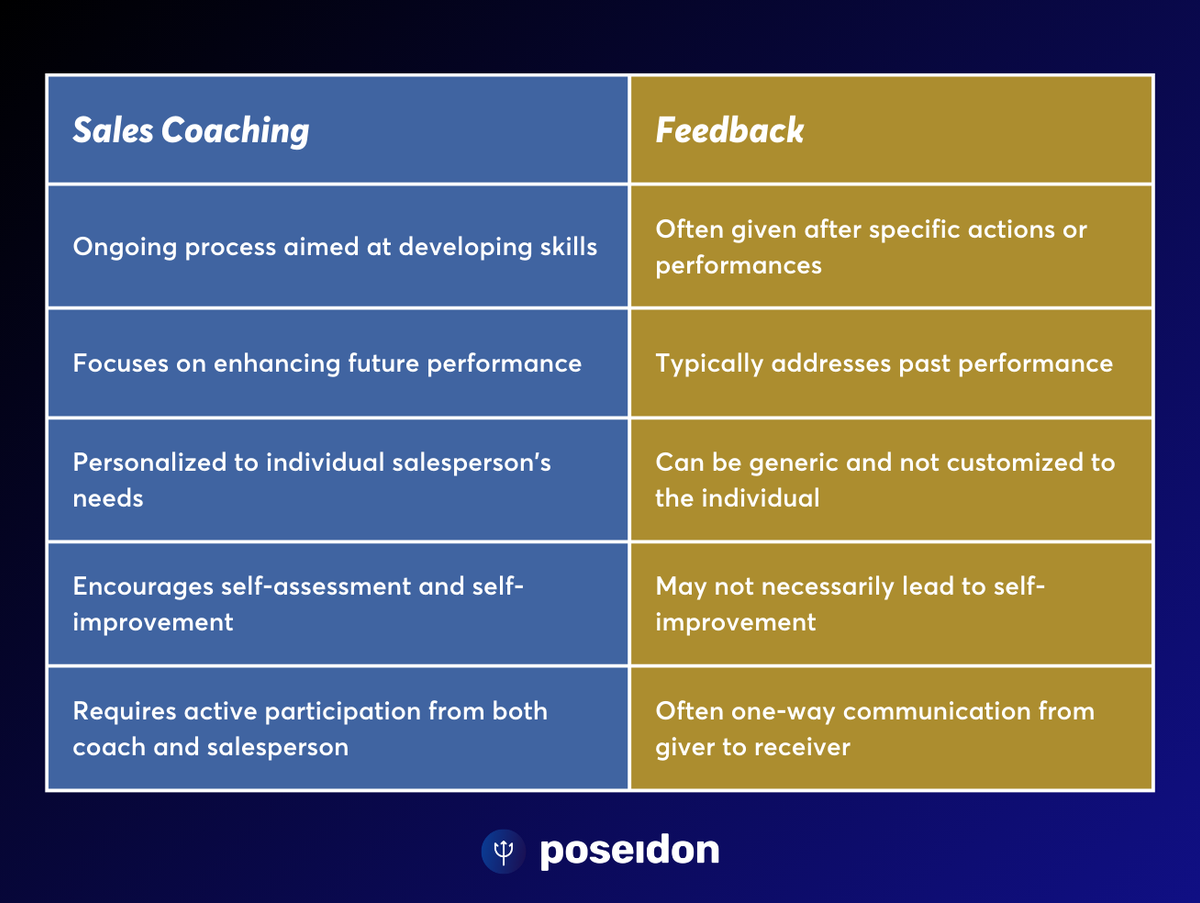Sales coaching plays a crucial role in not just driving results but also shaping the long-term success of your team.
It’s more than just giving feedback or reviewing numbers—it’s about building relationships, understanding individual strengths, and providing the right support to unlock potential.
Whether your sales team is made up of experienced professionals or new hires, a well-rounded coaching approach can make all the difference in performance and growth.
What is Sales Coaching?
Sales coaching involves guiding and developing sales professionals to improve their skills, achieve sales goals, and enhance overall performance.
A sales coach plays a critical role in providing personalized guidance and support to the sales team for continuous growth and success.
Definition
Sales coaching involves guiding and training sales reps to improve their skills, achieve sales goals, and boost business growth. Coaches work closely with teams or individuals to develop strategies that enhance performance in the competitive world of B2B sales.
They focus on continuous training, leveraging digital trends, and fostering a culture of Self-improvement is vital for sales reps to enhance their sales skills. among sales professionals.
This practice is essential for driving revenue growth Through better communication skills are vital for salespeople, especially when navigating customer interactions., Product knowledge is a crucial component of effective sales training., goal setting, and effective sales management, sales reps can close deals more efficiently. team motivation. Effective sales coaching ensures that each member of the sales team can meet their targets by mastering various sales techniques and management strategies.
Role of a Sales Coach
A sales coach plays a crucial role in guiding sales reps toward achieving their full potential within the sales organization. They provide continuous training, skills development, and performance improvement strategies customized to each individual's needs.
Coaches employ varied coaching styles to match different learning preferences, ensuring that techniques such as goal setting, communication skills enhancement, and product knowledge become second nature to their teams.
Good coaching is about leadership and understanding the needs of your team.
Sales Coaching vs Feedback
Understanding the distinction between sales coaching and feedback is crucial for developing effective sales strategies. Here's a concise comparison to illuminate the differences:

Sales coaching and feedback are both integral to a sales team's success, playing distinct roles in growth and improvement. Implementing both strategies thoughtfully can drive superior sales performance and team development.
3 Benefits of Sales Coaching
Sales coaching leads to improved sales performance and increased employee satisfaction, ultimately enhancing customer relationships. It also boosts revenue growth by developing the skills of sales reps through continuous training and evaluation of the sales team.
1. Improved sales performance
Improved sales performance is a direct result of effective sales coaching. By implementing tailored coaching strategies, sales professionals can enhance their communication skills, goal setting techniques, and product knowledge.
This ultimately leads to increased revenue growth and business expansion. In fact, according to recent data, companies that provide continuous training for their sales team experience a 50% higher net sales per employee compared to those who do not invest in such programs.
For instance, focusing on middle 60% performers through targeted coaching has been proven to yield significant productivity gains and unlock the secrets of potential revenue growth opportunities.
2. Increased employee satisfaction
With regular and tailored coaching, companies experienced a 20% increase in employee satisfaction. Sales reps who received effective coaching reported feeling more supported and valued, leading to Higher morale and motivation can significantly impact the sales process..
With improved job satisfaction, sales professionals are more likely to stay with the company, reducing turnover costs.
The implementation of coaching programs resulted in a 25% boost in employee engagement can be achieved by implementing structured sales training programs. among sales teams, particularly when guided by a strong sales leader. This increased satisfaction translated into tangible benefits for businesses, as engaged employees are more productive and contribute positively to the overall work environment.
3. Enhanced customer relationships
Enhanced customer relationships are a key outcome of effective sales coaching. By focusing on developing strong interpersonal skills and understanding customer needs, sales reps can build trust and loyalty with their clients.
This results in improved customer satisfaction ratings, increased repeat business, and ultimately higher revenue for the company.
The techniques employed during sales coaching, such as active listening and empathetic communication, contribute to fostering positive interactions between sales professionals and their customers.
A study by Harvard Business Review Research revealed that businesses with strong customer relationships experience a 37% increase in sales opportunities compared to those without, highlighting the importance of effective sales management. Moreover, according to Salesforce Research, 75% of customers are more likely to make another purchase if they have had a positive experience with a company's representative.
These statistics emphasize the immense impact that enhanced customer relationships can have on overall business growth.
4 Techniques for Effective Sales Coaching
Incorporating sales data, using varied coaching styles, and getting buy-in from team members are all essential techniques for effective sales coaching. To discover more about mastering the art of effective sales coaching, continue reading.
1. Use of sales data
Sales data is a critical tool for effective sales coaching. Analyzing sales performance metrics, such as conversion rates and average deal size, provides valuable insights into individual and team performance.
By identifying specific areas of strength and improvement opportunities through data analysis, sales coaches can tailor their coaching strategies to address the unique needs of each sales rep.
Furthermore, leveraging historical sales data helps in setting realistic sales targets, tracking progress towards goals, and making informed decisions based on trends and patterns.
Utilizing a structured coaching plan can significantly improve the effectiveness of the sales call. real-time and historical sales data empowers coaches to provide targeted feedback, identify training needs, and recognize top performers. This enables a more focused approach to skill development tailored toward achieving revenue growth and meeting sales goals while also fostering a culture of continuous improvement within the sales team.
2. Varied coaching styles
Effective coaching relies on adapting to the individual needs of sales reps and leveraging various coaching styles to cater to a diverse team. Here are several coaching styles that can be employed for maximum impact:
-
Directive Coaching: Instructive approach where the coach provides specific instructions and guidance on how tasks should be performed.
-
Facilitative Coaching: Encourages the sales rep to explore solutions independently through open-ended questioning and active listening.
-
Collaborative Coaching: Involves an equal partnership between coach and sales rep in problem-solving, goal-setting, and decision-making.
-
Transformational Coaching: Focuses on inspiring and motivating sales reps by tapping into their emotions, values, and personal goals.
-
Supportive Coaching: Provides emotional support, encouragement, and empathy while guiding the sales rep towards their objectives.
-
Holistic Coaching: Takes into consideration the overall well-being of the sales rep, addressing both professional and personal aspects for improved performance.
Each coaching style offers unique advantages in different scenarios, allowing the coach to tailor their approach according to the specific needs of each sales rep. This flexibility contributes significantly to driving skills development, performance improvement, and achieving sales goals.
3. Getting buy-in from team members
To get buy-in from team members, involve them in the sales coaching process by seeking their input and feedback. Encourage open communication to understand their needs and concerns.
Recognize and acknowledge their efforts, providing a sense of ownership in the coaching program. Utilize data to illustrate the impact of effective sales coaching techniques on individual performance and overall team success, fostering enthusiasm for participation.
Engaging team members in decision-making processes is crucial for establishing a supportive and collaborative environment, essential for successful sales coaching initiatives.
4. Leverage top performers
When leveraging top performers for effective sales coaching, it is essential to identify their specific strengths and strategies that contribute to their success. Utilizing top performers as role models can inspire and motivate other team members to emulate their best practices, driving overall performance improvement.
By analyzing the techniques and approaches of these high achievers, coaches can develop tailored training programs that focus on replicating their successful tactics across the entire sales team.
This approach not only fosters a culture of continuous learning but also elevates the skill set of all team members, ultimately leading to enhanced revenue growth and business success.
5 Best Practices for Sales Coaching
Focus on developing the middle 60% of your sales team, emphasizing self-improvement and providing positive feedback while also having difficult conversations. Incentives can motivate the team to excel in their performance and achieve sales goals effectively.
1. Focus on middle 60%
When coaching your sales team, it's crucial to focus on the middle 60% of performers. These individuals have the potential for significant improvement and can make a substantial impact on overall sales performance.
By providing targeted coaching and support to this group, you can elevate their skills, boost their confidence, and ultimately drive better results for your business.
Investing in the development of your middle-performing sales reps not only helps them reach higher levels of success but also strengthens the overall performance of your sales team.
With tailored training and focused attention, these team members can bridge the gap between average performance and high achievement, contributing to a more balanced and effective sales force.
2. Emphasize self-improvement
Transitioning from focusing on the middle 60% to emphasizing self-improvement is crucial for cultivating a culture of continuous growth within your sales team. Encouraging individuals to set and pursue personal development goals not only fosters their skills but also drives overall team performance.
By providing resources for skill enhancement, such as workshops, online courses, and mentorship programs, sales professionals can take charge of their own improvement journey.
Empowering your sales reps to seek more than just meeting targets and quotas can lead to enhanced sales skills. productivity and job satisfaction. When team members are motivated to enhance their product knowledge, communication skills, and goal-setting abilities, they become valuable assets in driving business growth and staying competitive in the ever-changing digital trends landscape.
3. Use of incentives
Incentives are a powerful tool for motivating sales teams and driving performance. Offering rewards such as bonuses, trips, or other perks can inspire sales reps to exceed their targets and achieve higher levels of productivity.
In fact, companies that use incentives in their sales coaching programs report an average 22% increase in revenue growth compared to those who do not. By aligning incentives with specific sales goals and KPIs, organizations can create a culture of healthy competition and goal attainment, ultimately leading to improved overall sales performance.
Research shows that 78% of employees are motivated by incentive programs, making it a valuable strategy for enhancing team motivation and productivity. When implemented effectively, incentives can serve as a catalyst for individual skills development and continuous training within the sales team.
This approach not only fosters healthy competition but also boosts employee satisfaction and engagement – essential elements for achieving long-term business growth.
4. Provide positive feedback
Positive feedback is essential for motivating sales reps. It reinforces good performance and encourages continued improvement. Acknowledging specific achievements, such as meeting or exceeding sales goals, can boost morale and confidence.
Sales coaches should provide regular positive feedback to recognize efforts and successes to maintain a motivated and engaged sales team.
Incorporating positive feedback into coaching sessions helps reinforce desired behaviors and skills, ultimately leading to improved sales performance. The use of incentives tied to positive outcomes can also serve as an effective method for reinforcing desired behaviors within the sales team, resulting in enhanced motivation and productivity.
5. Difficult conversations.
Addressing challenging situations head-on is critical for fostering growth within your sales team. Clear communication is the cornerstone of navigating tricky conversations and addressing performance issues effectively.
Offering helpful critiques, personalized assistance, and practical solutions during these conversations, you can steer your sales representatives toward enhanced performance and development.
Conclusion
To wrap it up, sales coaching is all about helping your team improve in a way that feels personalized and real. When you focus on giving clear guidance, honest feedback, and ongoing support, you’re setting your team up for success in both their careers and day-to-day work. Done right, these coaching practices can boost performance and create a positive, growth-focused culture that pays off in the long run.


![High Ticket Clients: 10 Ways To Prospect [Guide]](https://cdn.sanity.io/images/l79olr63/production/f1de7ff296d71958f1da4903a0291bcdea3577dd-1232x928.png)

![Best LinkedIn Sales Strategy In 2025 [+Templates]](https://cdn.sanity.io/images/l79olr63/production/f506b7ad35e15d3d5fcdb46ee807bbda7f5df908-1232x928.webp)
